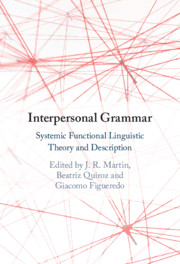Book contents
- Interpersonal Grammar
- Interpersonal Grammar
- Copyright page
- Contents
- Figures
- Tables
- Contributors
- 1 Introduction: Theory and Description in Interpersonal Grammar across Languages
- 2 Interpersonal Grammar in Spanish
- 3 Interpersonal Grammar in Khorchin Mongolian
- 4 Interpersonal Grammar in Mandarin
- 5 Interpersonal Grammar in Tagalog: Assessment Systems
- 6 Interpersonal Grammar of Pitjantjatjara
- 7 Interpersonal Grammar in Brazilian Portuguese
- 8 Interpersonal Grammar in British Sign Language
- 9 Interpersonal Grammar in Scottish Gaelic
- Index
- References
4 - Interpersonal Grammar in Mandarin
Published online by Cambridge University Press: 21 May 2021
- Interpersonal Grammar
- Interpersonal Grammar
- Copyright page
- Contents
- Figures
- Tables
- Contributors
- 1 Introduction: Theory and Description in Interpersonal Grammar across Languages
- 2 Interpersonal Grammar in Spanish
- 3 Interpersonal Grammar in Khorchin Mongolian
- 4 Interpersonal Grammar in Mandarin
- 5 Interpersonal Grammar in Tagalog: Assessment Systems
- 6 Interpersonal Grammar of Pitjantjatjara
- 7 Interpersonal Grammar in Brazilian Portuguese
- 8 Interpersonal Grammar in British Sign Language
- 9 Interpersonal Grammar in Scottish Gaelic
- Index
- References
Summary
This chapter is a text-based study of the enactment of interpersonal meaning in Mandarin, with particular focus on the MOOD system and structure, part of interpersonal grammar that is involved in the realisation of the discourse-semantic system of NEGOTIATION. The data considered is taken from the genres of criminal case courtroom discourse, realised interpersonally by a tenor of unequal social status and lack of reciprocity of linguistic choices among the speakers. The study adopts an axis-oriented trinocular perspective, foregrounding paradigmatic relations as the fundamental principle of linguistic organisation and reasoning about system-structure relations from above, round about and below. The analysis shows that MOOD in Mandarin is not only responsible for negotiating knowledge and action exchanges between moves in dialogue, but also closely interacts with MODALITY and POLARITY systems that are associated with the subsystem ENGAGEMENT of the discourse semantic system APPRAISAL. Therefore a complementary description of Mandarin MOOD is presented with a perspective oriented toward both NEGOTIATION and ENGAGEMENT.
- Type
- Chapter
- Information
- Interpersonal GrammarSystemic Functional Linguistic Theory and Description, pp. 96 - 129Publisher: Cambridge University PressPrint publication year: 2021
References
- 4
- Cited by

